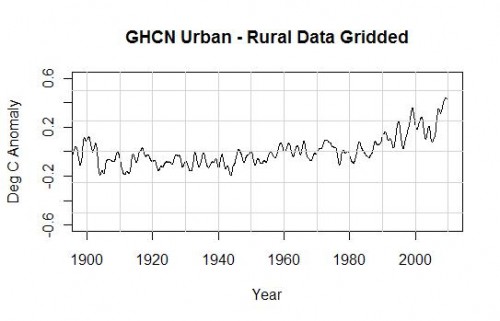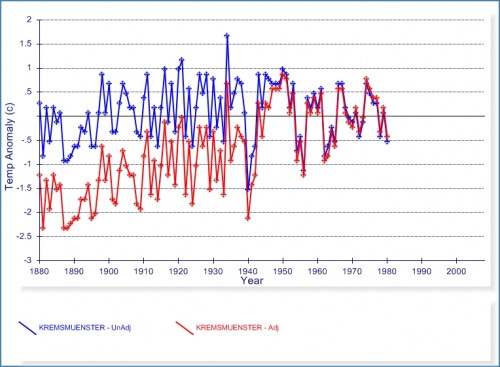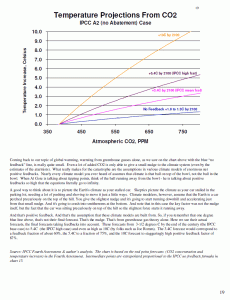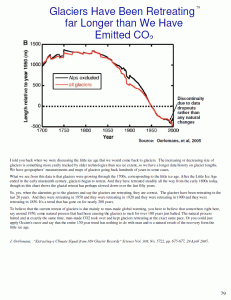Last week I did a very enjoyable interview Stefan Molyneux of FreeDomain Radio. My presence was almost superfluous, as Stefan was incredibly well-informed as well as passionate on climate topics. Our discussion hits on many critical topics related to the science of the skeptics position, from positive feedbacks to urban heat biases to hockey sticks. The interview is embedded below, but I encourage you to check out his site, he seems to get a lot of interesting interviews of which I appear to be the most pedestrian.
Yearly Archives: 2010
Don’t Mistake Other People’s Public Confidence for “Proof”
All too often, people mistake other people’s confidence in a particular proposition as sufficient evidence for they themselves to believe the proposition. No where is this more evident than in global warming. But the recent IPCC flipflop on Himalayan Glaciers provides an excellent example of just how flimsy the basis can be for other people’s public confidence.
Just 2 months ago, IPCC chairman Rajendra Pachauri was saying this:
A leading climate scientist [IPCC Chariman Rajendra Pachauri] today accused the Indian environment ministry of “arrogance” after the release of a government report claiming that there is no evidence climate change has caused “abnormal” shrinking of Himalayan glaciers….
Today Ramesh denied any such risk existed: “There is no conclusive scientific evidence to link global warming with what is happening in the Himalayan glaciers.” The minister added although some glaciers are receding they were doing so at a rate that was not “historically alarming”.
However, Rajendra Pachauri, the chairman of the IPCC, told the Guardian: “We have a very clear idea of what is happening. I don’t know why the minister is supporting this unsubstantiated research. It is an extremely arrogant statement.”…
Pachauri dismissed the report saying it was not “peer reviewed” and had few “scientific citations”.
“With the greatest of respect this guy retired years ago and I find it totally baffling that he comes out and throws out everything that has been established years ago.”…
In response Pachauri said that such statements were reminiscent of “climate change deniers and school boy science”.
So Pachauri is coming out firing. His science is well-established, theirs is “school boy” and not “peer reviewed.” Pachauri not only says this guy is wrong, but he that he is a bad guy for even bringing it up. You see him actively questioning his motives, as if this is somehow a scheme and Pachauri just hasn’t figured it out yet.
But now, two months later, we know exactly the quality of science that Pachauri was defending:
A WARNING that climate change will melt most of the Himalayan glaciers by 2035 is likely to be retracted after a series of scientific blunders by the United Nations body that issued it.
Two years ago the Intergovernmental Panel on Climate Change (IPCC) issued a benchmark report that was claimed to incorporate the latest and most detailed research into the impact of global warming. A central claim was the world’s glaciers were melting so fast that those in the Himalayas could vanish by 2035.
In the past few days the scientists behind the warning have admitted that it was based on a news story in the New Scientist, a popular science journal, published eight years before the IPCC’s 2007 report.
It has also emerged that the New Scientist report was itself based on a short telephone interview with Syed Hasnain, a little-known Indian scientist then based at Jawaharlal Nehru University in Delhi.
Hasnain has since admitted that the claim was “speculation” and was not supported by any formal research. If confirmed it would be one of the most serious failures yet seen in climate research. The IPCC was set up precisely to ensure that world leaders had the best possible scientific advice on climate change.
In effect, Pachauri was defending a proposition based on, effectively, a cocktail-party quality speculation reported in a telephone interview in a throwaway, non-peer-reviewed article in a popular magazine.
I May Have Found The Problem With the Climate Models
Last quarter I taught Atmospheric Sciences 101 at the University of Washington, a large lecture class with a mix of students, and gave them a math diagnostic test as I have done in the past. The results were stunning, in a very depressing way. This was an easy test, including elementary and middle school math problems. And these are students attending a science class at the State’s flagship university–these should be the creme of the crop of our high school graduates with high GPAs. And yet most of them can’t do essential basic math–operations needed for even the most essential problem solving.
Here’s a link to a PDF version of the full test and results, and here’s a blank version to give your kids and friends.
Consider these embarrassing statistics from the exam:
The overall grade was 58%
43% did not know the formula for the area of a circle
86% could not do a simple algebra problem (problem 4b)
75% could not do a simple scientific notation problem (1e)
52% could not deal with a negative exponent (2 to the -2)
43% could not do simple long division problem with no remainder (see above)!
Actually, I am just having fun with this. My guess is that this is a general college problem and not one limited to the atmospheric sciences, though I will say that my experience in engineering is that the “trendy sciences” (whatever the trend might be at the moment, when I was in school it was a new energy program) tend to attract students less prepared for mathematical rigor. Perhaps this is true of climate today?
LOL, Missed My Chance at History
Something I discovered only days after the Climategate (I guess that unfortunate name is going to stick) story broke, I finally noticed a comment on my blog on the night of the release notifying me and my readers of the availability of the email file. It was pretty far down in a pretty random, really a throwaway post, and I didn’t notice until days later when the story had moved on. I never mentioned it because I was kind of embarrassed that I don’t seem to exercise the same real-time scrutiny on my comments as other bloggers seem to be able to manage.
Well, the embarrassment is worse than I thought, because by Steve McIntyre’s timeline, this site may have been first. I got a weird email that night that I frankly could not figure out that in retrospect may have been related. Anyway, I missed my chance. Which is fine because much more dedicated bloggers soon jumped on the case.
If you are wondering where I am, I am steadily working through a new 90-minute studio lecture (ie much better sound quality than here) on the science of the skeptic’s position. I have seen many good presentations of late but I really think I have hit on a good, balanced presentation and I am excited to share it soon.
WTF? Is this Really What They Do?
In fact, the Met [UK meteorology office] still asserts we are in the midst of an unusually warm winter — as one of its staffers sniffily protested in an internet posting to a newspaper last week: “This will be the warmest winter in living memory, the data has already been recorded. For your information, we take the highest 15 readings between November and March and then produce an average. As November was a very seasonally warm month, then all the data will come from those readings.”
Look, I think some of these guys’ process is nuts, but this is too crazy to believe. Any other background on tis?
The Power of Branding
This last week we saw the power of branding in the political arena. By rebranding anthorpogenic global warming as “climate change,” alarmists are able to say things like this (this is White House spokesman Robert Gibbs commenting on recent very cold weather)
Gibbs: “I think that one only has to step outside here or visit where I used to work in Chicago to understand that climate change, and the record temperature that climate change is likely causing, is with us….I would say that eve in places that are used to getting very cold weather, record cold…our weather patterns have been affected by change in our climate”
Wow, I guess its all about the science. Except for the following problem: no living human being has suggested any credible mechanism by which CO2 can cause climate change without the intermediate step of warming. CO2 causes warming, which in turn might or might not cause more, say, severe storms. But there is no evidence of CO2 causing more temperature volatility (particularly extremes to the cold side) and even those who have suggested that global warming might lead to more volatility would be forced to admit, if they are being honest, that this is more volatility around a higher mean, such that there still should not be a lot more record lows.
How Temperatures are Measured By Satellite
I always wondered how they calibrated satellite temperatures measurement when they make no reference or calibration to any surface temperature record. Here is how its done.
The Hockey Stick
Via WUWT, Jeff Id takes a look at the GHCN temperature data base, specifically comparing warming in urban vs. rural locations. As found in a number of other studies, about half of 20th century warming int he surface temperature record may be due to uncorrected urban biases.
Some past takes on the same subject:
- Ross McKitrick has delivered this same finding several times
- LaDochy et al found similar results for California
- Even Phil Jones finds as much as 40% of warming in his data base from urban bias, though he tries to disguise the finding.
- Even a kid can demonstrate it.
- Actually, even my kid can demonstrate it.
Last Gasp of the Old Debate Template
Rolling Stone (and here) manages to write over 5000 words on those opposed to climate alarmism without once acknowledging that any skeptic might have well-intentioned disagreement with the science itself. Without once addressing a single scientific issue in the debate, the article dismisses the need to do so by painting every skeptic of every stripe as shills for the oil and coal industry. All the while ignoring identical rent-seeking, financial incentives, and enormous political and propaganda spending in the alarmist community.
This is such a stale and unhelpful way to address climate issues that I am relieved that 2009 may mark the year when this form of argument no longer had much power — which is why I have, perhaps over-optimistically, labeled this the last gasp of the old climate debate template.
By the way, I would like to again remind the skeptic community not to fall into the same trap. Yes, I know it is good turn-about fun to demonstrate that skeptic spending pales before alarmist spending, or to talk about the billions of dollars Al Gore and others have on the line with their alarmism. But while these are useful issues to point out in passing, the opportunity is available to actually force debates on the actual state of the science, and I would hate to squander it in dueling ad hominem battles.
Station Adjustments
The American Thinker blog is running a daily series of charts showing raw and “value added” or adjusted station data. The amount of the global warming signal that comes from manual adjustments rather than actual measurements is something we have discussed here before, but you can see in each of their daily examples.
Unadjusted and adjusted temperatures at Kremsmuenster, Austria
Source: AppInSys (Applied Information Systems) using NOAA/GHCN database for Kremsmuenster, Austria
You can create the same charts for any station here.
Climate Presentation
I have cleaned up my Powerpoint presentation and added my narration on the notes pages. I have this available both as a .ppt file as well as a pdf. The pdf, I think, works particularly well — it looks and reads more like a book. This is my best current cut at presenting the science of the skeptic’s position and mostly supersedes my earlier book. Right click either to download. You are welcome to use the presentation with your own local groups.
Powerpoint presentation with notes pages (.ppt)
Some example pages:




